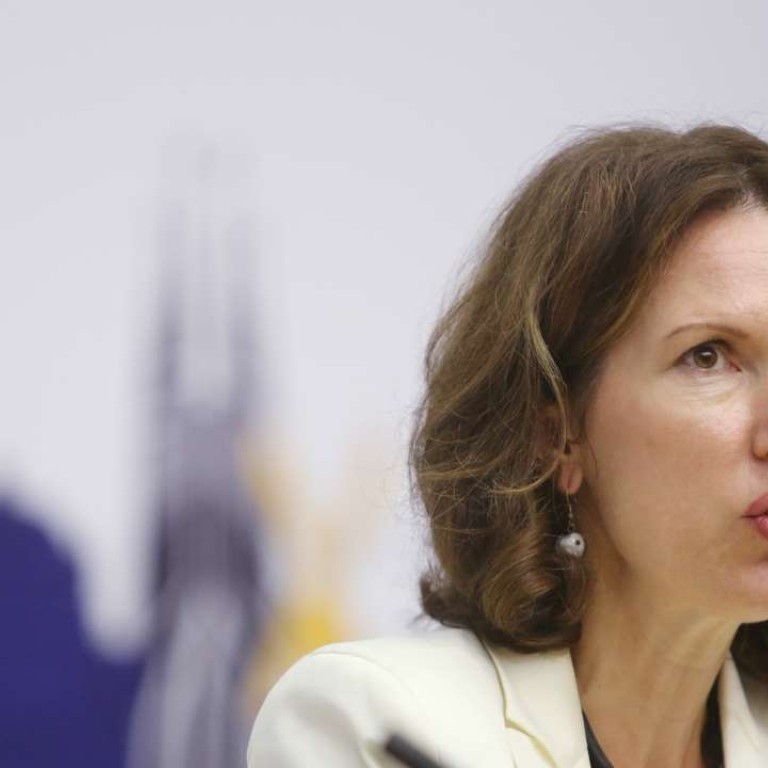
British consul general: Hong Kong’s ‘one country, two systems’ has worked ‘incredibly well’ since 1997 handover to China
Caroline Wilson dismisses suggestions from some Hongkongers that the city should return to UK rule
Britain’s highest-ranking official in Hong Kong said on Thursday that “one country, two systems” had worked “incredibly well” and any “small challenges” between the city and the mainland could be overcome.
The comments from Caroline Wilson, the British Consul General to Hong Kong and Macau, came during a Facebook Live session where she responded to questions and comments from the public.
The diplomat, who has served as consulate to Hong Kong and Macau since September 2012, is preparing to conclude her four-year post before returning home.
When asked during the session if the UK would take back control of Hong Kong, she said: “This is an easy one because no, the UK will not take back Hong Kong.
“We thought about this long and hard 30, 40 or 50 years ago, the fact is that Hong Kong’s place is firmly within the People’s Republic of China under the ‘one country, two systems’ framework, which has on the whole worked incredibly well in the 20 years since the handover.
“In any place, there are challenges. I am absolutely confident that Hong Kong and China will overcome any small challenges and Hong Kong will continue to prosper and flourish.”
A second Facebook user asked whether Wilson thought Hong Kong would have improved trade if it returned to UK rule.
But she re-emphasised she thought the “one country, two systems” framework would be more beneficial to Hong Kong.
“What we think is good feng shui and good for business is actually again to have very strong ties with Hong Kong as a special administrative region part of the People’s Republic of China,” she said.
“We have very strong ties now with China as well as with Hong Kong, I am delighted to say, and those are going to continue going forward.”
James Sung Lap-kung, political analyst at City University, said it appeared the British Consulate was keen to distance itself from the localist movement ahead of the upcoming Legco elections.
“Obviously the independence of Hong Kong is the main issue, as is the self-determination of localists,” he said.
“The UK is getting some political pressure from the so-called localist groups in asking the UK to help them achieve independence. In that sense, it is good for the consul to say something before the election, that the ‘one country, two systems’ is right. The problem for the localists is that the UK has no interest in taking back power in Hong Kong.”
Sung also said that the consulate might be hesitant to appear sympathetic to the localists’ cause in light of the efforts by Prime Minister Theresa May to placate the Chinese government over the stalled Hinkley Point nuclear power station deal.
There have been tensions over the HK$180 billion deal after UK spies suggested Chinese investment in its nuclear power could threaten national security.
Dr Chung Kim-wah, assistant professor of politics at the Hong Kong Polytechnic University, agreed that the British consul general’s comments reflected her reluctance to jeopardise the UK’s relationship with mainland China.
“In the past few years, the British government is more concerned with its relationship with mainland China,” he said. “What the consul general said was realistic and practical. She said it in order to avoid offending China.”
During Ms Wilson’s discussion, there were also questions about British National Overseas (BNO) passports, the possibility of same sex marriages for British nationals in Hong Kong, and the implications of Brexit for the city.
Ms Wilson emphasised Hongkongers could only successfully apply for BNO status before the 1997 handover, and it was no longer possible to do so.
Later, Ms Wilson, who has been a strong supporter of Hong Kong’s LGBT community, said that Brits wanting to enter into a same-sex marriage could not do so in Hong Kong because they were still subject to the laws of the SAR.
“I can’t honestly report that we have had any progress,” she said. “But we have been working very hard at it. We can only conduct these ceremonies if there is no objection from the host government and unfortunately the host government is not happy and has objected to us conducting same-sex marriages. So it’s an issue we are going to continue pursuing.”
Ms Wilson is a Cambridge graduate and barrister who previously served as minister counsellor and director of UK Trade and Investment Russia.
Her office could not confirm her final working day in Hong Kong to the South China Morning Post today but it is expected she will complete her tenure next month.

